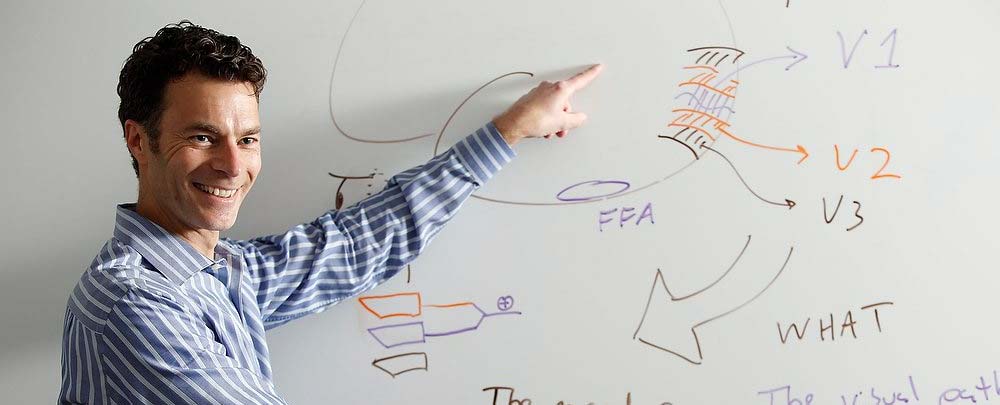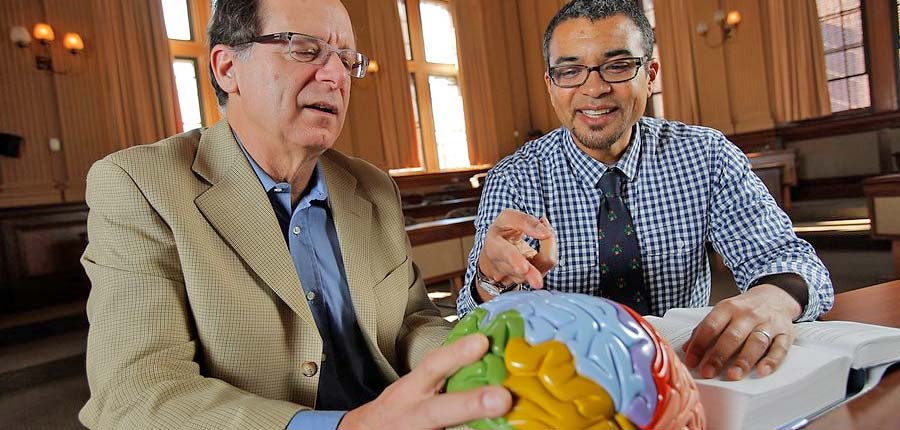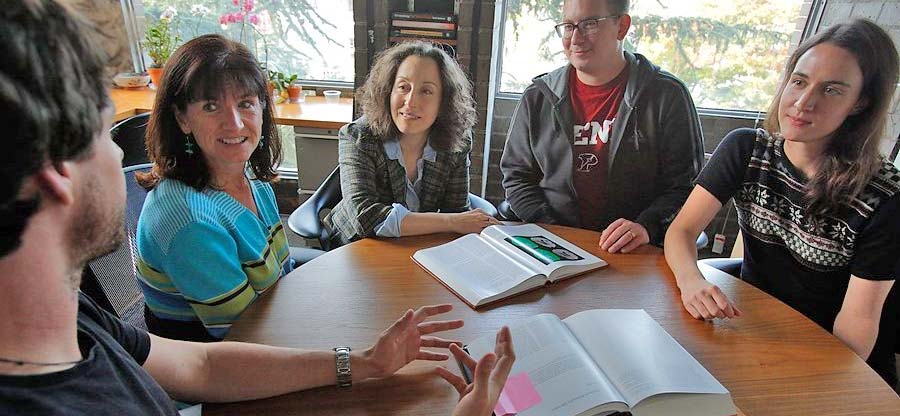CURRENTLY ACCEPTING APPLICATIONS FOR THE 2024-2025 ACADEMIC YEAR
Penn’s Center for Neuroscience & Society invites doctoral and professional students from a variety of Schools and Departments to explore the intersection of neuroscience with their home disciplines. Students will be accepted for the 2024-2025 academic year based on an application (link below) and each Fellow will participate for one year.
The program rests on two pillars. The first pillar is academic instruction, in the form of two graduate courses tailored to students from the humanities, social sciences and engineering departments and Penn’s professional schools. Students who majored in neuroscience as undergrads will not be required to take the first of these courses.
The second pillar is a series of activities and learning opportunities focused on neuroscience and its relevance to other fields, as well as professional development workshops for interdisciplinary scholars. More detail on each pillar follows.

I. Coursework
PSYC 5470 (Fall) Foundations of Social, Cognitive and Affective Neuroscience is designed to give a basic “textbook” understanding of the field – in other words, the kind of comprehensive but airbrushed version of the science that is the purview of textbooks. We pack a lot into this course. Students read most of two college textbooks and parts of another. In addition, they watch lectures online before coming to class, leaving class time for clarification, elaboration and discussion. Fellows who were neuroscience majors in undergrad need not take this course.
PSYC 7470/BIOE 7470 (Spring) Contemporary Research Issues in Social, Cognitive and Affective Neuroscience extends the textbook knowledge of 5470 into the primary research literature, with all of the gaps, controversies and ambiguities of science in the making. This enables students to read primary sources critically, as well as to appreciate the scientific processes behind the seemingly straightforward textbook understanding. We begin with the basics of research design and data interpretation, including recent methodological controversies, then progress to the collaborative reading and analysis of research articles. Each student produces a detailed assessment and critique of an article of the kind requested by journal editors, honed through drafts, workshopping with other students and extensive faculty feedback. Frontiers journals provide excellent grist for this process, as they tend to publish interesting but flawed articles.
II. Fellowship Activities
These activities complement the Fellowship’s classroom learning and provide flexible and low-pressure opportunities to learn about neuroscience and its relevance to other fields. Faculty from Penn and elsewhere will lead these activities focused on topics of interest to Fellows, emphasizing issues at the intersection of neuroscience and other disciplines. These sessions will explore the usefulness (or uselessness, as the case will sometimes be) of neuroscience in diverse fields, the social and ethical implications of neuroscience, and neuroscience topics of special importance for integrating neuroscience with other fields. Sessions will also help build professional skills for communicating interdisciplinary work and advancing one’s neuroscience understanding beyond the end of the year.
Examples of topics include: philosophical and practical applications of neuroscience to criminal law; privacy risks raised by engineering systems that record brain states; pharmaceutical and electric mechanisms of brain enhancement; and how to communicate on hot-button topics.
Examples of formats include Ask-Me-Anythings (AMAs) with neuroscience faculty on timely topics (psychedelic-assisted therapies, cerebral organoids, deep brain stimulation for behavioral problems), discussions of neuroscience relevant to current events (eg Flint water crisis, minimum age for gun purchases), Journal club-style discussions of recent or classic papers on “neuro-“ fields (eg neurolaw, neuroengineering, neurophilosophy), practical workshops (eg communicating neuroscience to laypersons, doing interdisciplinary work without “falling between two stools”) and coaching on future learning and networking.
Sessions will be 60-90 mins in length, with content chosen in consultation with the Fellows and scheduled to minimize conflicts (will be the biggest challenge of the program!). Fellows must participate in two activities per month (just one in December, January and May) from at least 4 on offer most months. Fellows in good standing will receive a small professional development fund to pay conference expenses, create a personal neuroscience library, or invest in other educational activity.

Application
If you are interested in the Center for Neuroscience & Society Graduate Fellows program, please submit an application using this Google Form.
For the 2024-25 academic year cohort, the priority deadline is July 12, 2024. If you are interested in applying but think you may need more time to get your application materials together, please reach out to info@neuroethics.upenn.edu and we will do our best to accommodate you. We will get back to applicants with a decision by August 12th, 2024.
Program Contacts
Director: Martha J. Farah (mfarah@upenn.edu)
Associate Director of Programs and Operations: Natalie Larkin-Gilmore (nlarkingilmore@neuroethics.upenn.edu)
Please forward general inquiries to info@neuroethics.upenn.edu


